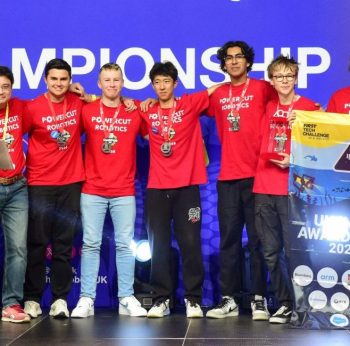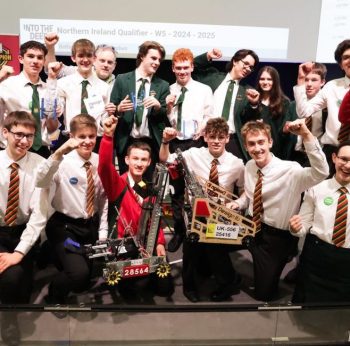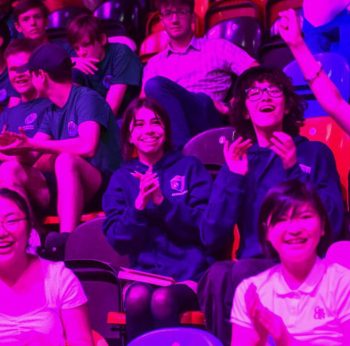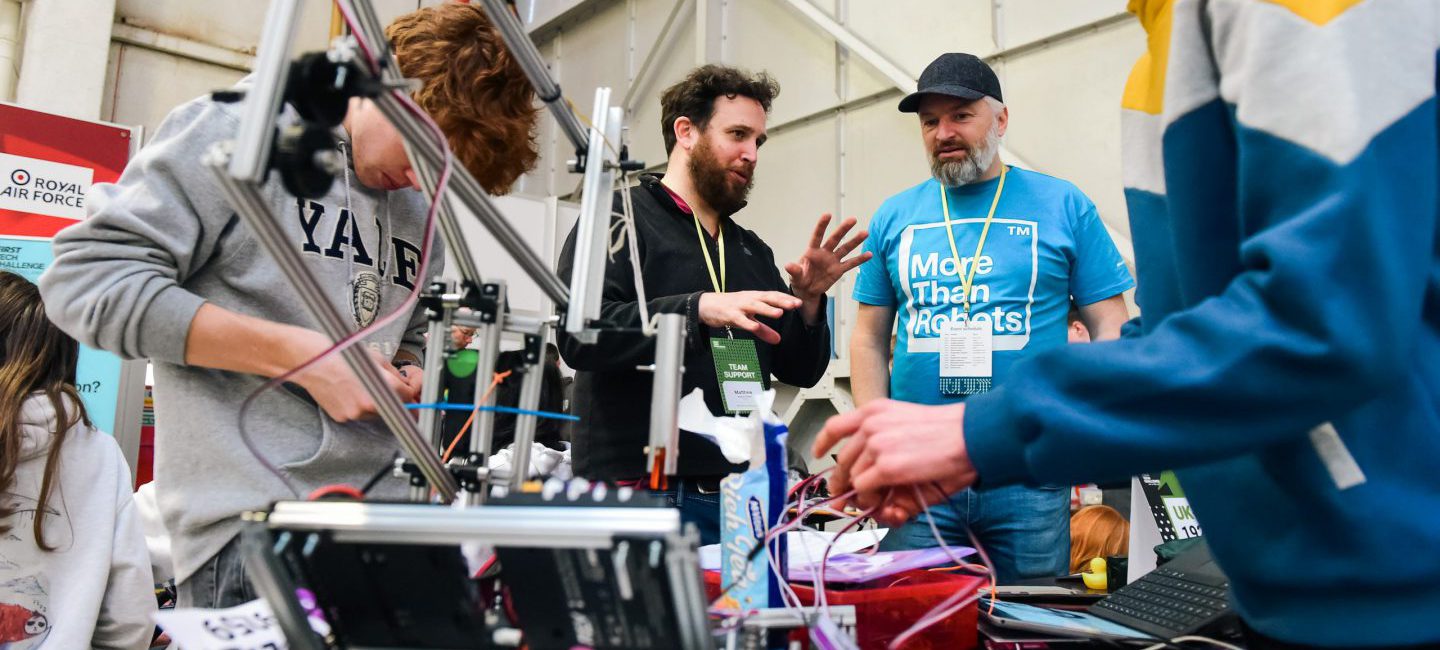
Volunteering with FIRST Tech Challenge UK is More Than Robots
Our volunteers, who we like to call Game Changers, drive our programme. Without them, our events wouldn’t be possible and our impact wouldn’t be as powerful. They play a huge role in helping us go even further in achieving our mission: to make STEM less intimidating, more diverse and inclusive.
We spoke to Joss Benyon, an A-Team Game Changer, mentor and all-around advocate for STEM about his experience with the challenge. He told us he’s even picked up a few things from the teams he mentors too!
Joss Benyon
Raytheon UK
Software Engineer and STEM Lead for Gloucestershire site
Volunteer roles: Lead Robot Inspector, Head Referee
Compass Award Winner, 2023-24
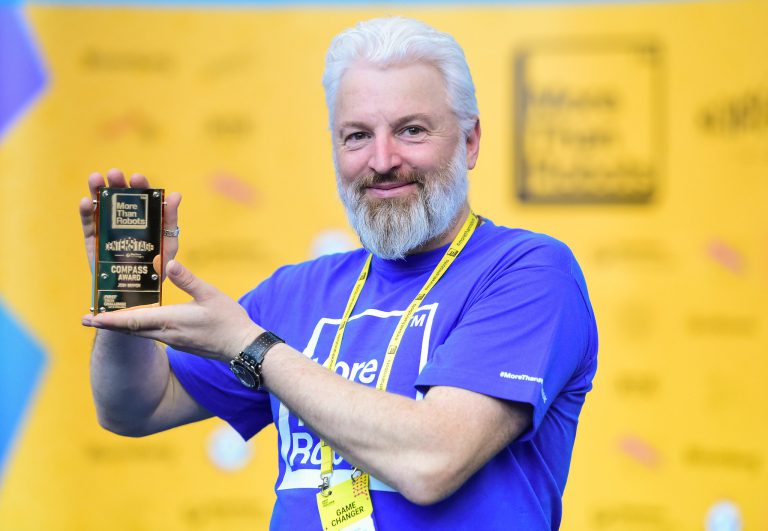
Joss Benyon wins the Compass Award 2023-24 thanks to his support for teams
“I think FIRST Tech Challenge UK shows young people what’s possible, just by trying things, experimenting and not having the final solution right away but being able to iterate and work towards it. It shows them mechanical and software engineering is for everybody and you can get involved at some level even if you’re not technical in those ways. It shows them there’s more than one path into STEM and there’s more than one career within it.”
Joss Benyon, Software Engineer, Raytheon UK
How did you get into volunteering with FIRST Tech Challenge UK?
When I started at Raytheon UK, I signed up to be a STEM Ambassador. I’d previously volunteered through our Quadcopter Challenge and we also run Cyber Days for schools. After a year or so, I stepped up to be the STEM lead for the Gloucestershire site.
I then found out that RTX is one of FIRST’s global sponsors and the more I looked into it, the more I was hooked. I think it’s a fantastic opportunity for young people.
What brings you back to volunteer year after year?
It’s fun to be involved in and I like working with the teams. The events themselves are always really good fun; everyone is really friendly and it’s a good atmosphere. You get to give something back to STEM and enjoy yourself while you’re doing it.
I like the troubleshooting aspect of my volunteer roles. That’s what half my job is anyway and trying to work out why things aren’t working while having that time pressure to help teams, is good fun.
What’s your approach as a mentor?
I always try to have a positive, can-do attitude. A lot of what I help teams with tends to be project management, setting realistic goals and making sure you celebrate the goals you achieve. I don’t go in and teach them – it’s more guiding them to discover new approaches.
I like having the technical role at events and the less technical part as a mentor.
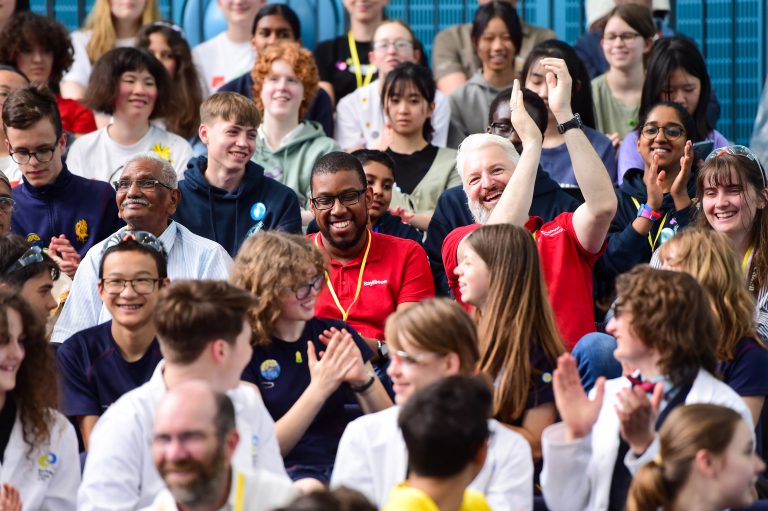
There’s nothing like seeing one of your teams succeed!
What do you enjoy most about working with teams?
Seeing them develop. Some young people start quiet and not very confident in their own abilities but gradually, they come out of their shells and become more confident.
You can see they’re learning not just technical skills, but life skills from all the various aspects of competing and encouraging other teams. I think the greatest professional knows how to celebrate other people’s successes, not just their own so it’s good to see them be part of the community and develop themselves.
There are definitely things I’ve taken from my mentoring and brought back to the project I’m working on, like new ideas and ways of doing things. For example, a team was using a plug-in for VS Code that I’d not heard of and I took it away to use on my own coding environment. It’s given me experience in managing different people and learning styles too.
Do you have any standout memories of Gracious Professionalism?
At events, I’ve seen teams that have struggled with things breaking and other teams lending them parts or helping them out in whatever way they can, even if they’re about to compete against each other. The team from SGS Berkeley Green UTC were really keen to pass on their knowledge to other teams who are new to the challenge too. It’s good to see the knowledge sharing not just within the team but between teams.
What’s your advice for teams this season?
Set goals each week. Work out what you want to achieve each week. The Berkeley team’s project manager, Katie, has been phenomenal. She’s got Gantt charts and is really on top of things. She’s really capable and is definitely going places, so keep an eye out for her.
Secondly, work with what you’ve got. Great is the enemy of good. If your robot does something, you can score points, so focus on that rather than worrying about trying to score points doing everything.
What’s your advice for aspiring Game Changers or mentors?
Just give it a go. Don’t be afraid to try new things, and don’t be afraid to not know the answers. You don’t need to know everything; you don’t need to be an expert in robotics or project management.
Join the Game Changer community!
Volunteer registration is open! Help us make an impact for our biggest season yet.

